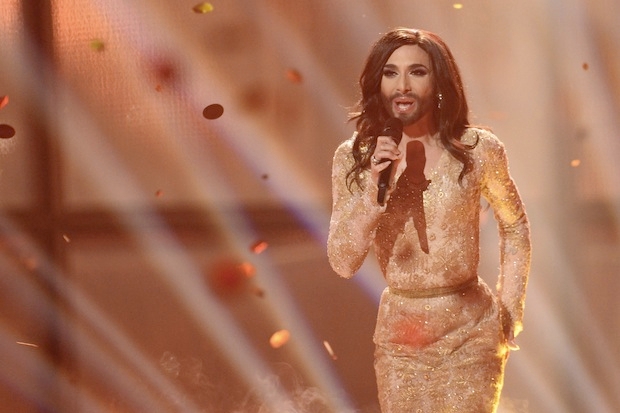Oskar Morgenstern grew up in Vienna, John von Neumann in Budapest. Clearly the same Austro-Hungarian intellectual spirit which gave rise to Zur Theorie der Gesellschaftsspiele and their seminal joint work Theory of Games and Economic Behaviour is still alive in that part of the world, because the Austrians chose a bearded transvestite to represent them in the Eurovision song contest. Oskar and John would have been very proud.
If you want a really childish explanation of game theory, it is that when everyone else goes around shouting ‘rock’, a few smart people should start to shout ‘paper’. And perhaps a few really smart and really brave people, figuring out this ‘paper’ strategy in advance, might even be emboldened to shout ‘scissors’. In Eurovision this year, Poland shouted ‘paper’; Austria shouted ‘scissors’.
The cunning real trick here is that, if you want to win Eurovision, it is better to do something distinctive than to do something conventionally good. That is not to say that the distinctive cannot be good or even great (France Gall’s and Serge Gainsbourg’s 1965 winning song ‘Poupée de cire, poupée de son’ was booed in rehearsals simply for not being a standard ballad; ‘Waterloo’ was highly unusual at the time). But the fact is that, even if you miraculously produce a conventional song that is 10 per cent better than the 15 other conventional ballads you are competing against, that 10 per cent advantage is never enough to drown out all the noise created by regional voting blocs, national rivalries and so forth. Better to go all or nothing — ‘Monte Carlo or bust’ — in this case by fronting someone with the second most famous facial hair of any Austrian in history. That way you will either win spectacularly or lose spectacularly, but you won’t end up coming fourth just because the bloody Scandies all voted for each other again.
The reason more people don’t try this is simple. It takes courage. When you fail conventionally you get sympathy; when you fail unconventionally you get blamed. It’s a behavioural bias known as defensive decision-making, and it affects almost everything.
When making any choice, our first instinct is not to choose the ‘best’ answer but the answer which minimises the harm we personally can suffer in the worst-case outcome. (‘Minimax’ is what John von Neumann calls this). Let’s say I have the deciding vote on Austria’s entry to Eurovision: if I pick some boring but worthy schlager and it loses, I keep my job. If I choose a drag artist with a beard and she loses, then the finger-pointing begins.
This defensive decision-making explains why bureaucracies are so inefficient. It infects middle management at large companies, making them incapable of innovation. (It also explains why entrepreneurs, being beholden to no one, are so valuable.)
More worryingly, defensive decision-making may kill thousands of people every year. As Gerd Gigerenzer explains in his new book Risk Savvy (already my candidate for the best book of the year), a vast proportion of medical tests, interventions and referrals are unnecessary. They make no sense statistically, but the doctor is instinctively afraid he or she might be sued for not performing them.
This, to me, raises a significant question. Could the NHS be made significantly better if patients were free to waive the right to sue except in cases of egregious incompetence?
I would willingly sign away my right to sue as a gesture of principle: put simply, I prefer money to be spent on doctors than lawyers. Moreover, if Gigerenzer is right, it might actually improve the quality of patient care. If any doctors are reading this, I’d like a second opinion.






Comments